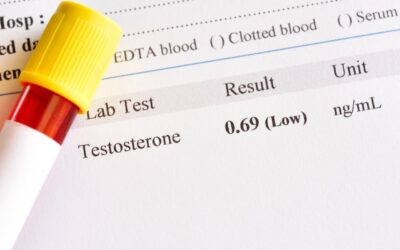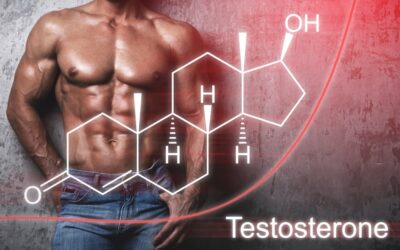Over the past 40 years, the world has seen a decline in testosterone levels in men. For whatever the reason, whether it be a polluted environment or chemicals in our food, “T levels” have been trending lower.
As a result, testosterone replacement therapy is growing ever more popular. Its effectiveness for men has created a growing chain of supply and demand with testosterone doctors and clinics in nearly every country.
Due to advances in biochemical technology, men now have a choice. Many are choosing to reverse the harsh effects of low T with testosterone replacement therapy. Testosterone benefits are many. But often men with adequate levels of testosterone are oblivious to the benefits until they begin to experience the effects of low T. Once they do, sometimes the only solution is to replace the lost testosterone.
So what exactly is testosterone and why is it important to a man’s health? Testosterone is a hormone produced in a man’s testicles that’s essential to male characteristics. Adequate supply in the bloodstream equates to a healthy life and good mood.
However, testosterone levels do not remain consistent throughout a man’s life. Unfortunately, after the age of 30, one study (Harman et al 2001; Feldman et al 2002). indicates men lose an average of 1.6% of total testosterone per year – while free and bioavailable levels drop off 2-3%. As the years pass, these numbers add up and cause a significant decline in a man’s health and well-being. To date, testosterone therapy is the only known remedy to restore lost levels of T. If properly restored, these are some of the benefits a man will enjoy from testosterone replacement therapy.
• Greater bone density
• Increased sex drive and higher sperm production
• Better sleep
• Reduced body fat and increased muscle mass
• Improved mood
You can see from this list the benefits of testosterone therapy are systemic and critical to health. Bringing up low levels of T to normal levels can easily increase a man’s quality of life.
Let’s further explore the benefits of testosterone replacement for the aging man.
Greater Bone Density
Testosterone levels in men show a correlation in size between the size of the bone and the amount of T in the body. The more testosterone, the greater the bone density.
However, estrogen levels also play an important role in bone density. The more estrogen in a man’s system, the lower the bone density. It is therefore important to not only raise testosterone levels but to keep estrogen in check as well. If done correctly, men who suffer from hypogonadism (or men with low T) will experience an increase in bone health.
A large number of trials have shown the testosterone treatment has a positive effect on bone density in men with low T. Men who are on replacement therapy can often expect to see their bone density levels return to near normal levels after two years of use. Snyder et al 2000; Wang, Cunningham et al 2004; Aminorroaya et al 2005 This is great information to know for aging men with low levels of testosterone. Bone density is extremely important. If too low, fractures or breaks can result. The best course of prevention would be testosterone replacement therapy plus weight resistance training. This should be maintained for the remainder of a man’s life.
Increased Sex Drive
Testosterone is one factor that has been correlated with libido in men. While having low testosterone does not always result in a low sex drive, most men who have low T report lack of drive.
Sexual activity in men usually causes a spike in testosterone. However, if a man has low T, he will experience less activity and desire for sex. Older men are especially susceptible to reduced sex drive, as testosterone and estradiol levels decrease with age. But even young men in their 20s and 30s can suffer from hypogonadism and a severely reduced sex drive.
In a number of studies we reviewed, both young and older men showed increased sex drive and more erectile ability following the treatment of testosterone replacement therapy Gray et al 2005)
In cases where we’ve helped men start testosterone therapy, many report high spikes in sex drive during the first several weeks of use. Sex drive usually lowers slightly after the first several weeks but remains consistent through use of the therapy.
These men report having more sexual thoughts, stronger erections, and more sexual activity. If they cycle off testosterone, there is a noticeable decline in libido and they often return to their previous levels.
Testosterone is also important for producing healthy sperm and keeping sperm count high. If a man experiences low T for years, or even decades, especially after age 50, infertility can occur. For this reason, it’s important to test your T levels and consider testosterone replacement therapy as an option.
Better Sleep
Low testosterone has been correlated with lower quality sleep, insomnia, and even sleep apnea. Testosterone is one of many hormones that affect sleep, but it’s one of the most important.
While studies are unclear as to exactly how testosterone affects sleep, some studies show correlations between testosterone and the functioning of the brain. One study out of Montreal demonstrated that low testosterone levels inhibited the functioning of the brain that’s responsible for REM sleep, or deep sleep.
When a man’s body is in REM sleep, he produces much of his testosterone. Unfortunately, if a man does not achieve REM sleep, he will fail to produce adequate levels of T. You can see how this can become a vicious cycle – no REM equals low T, and low T does not allow REM. If you suffer from insomnia or feel groggy, even after a full night’s sleep, you should check your testosterone levels. Chances are that your T levels are low, especially if you are an older male. Sleep is the single most important factor for health, even above diet and exercise. Lack of deep sleep can cause many long-term health problems. It can also lead to sleep apnea, which is a sleep problem on the rise in society today. Sleep apnea is thought to be caused by low T levels and increased body fat. If your T levels are low, it’s advised to get them tested. TRT is one possible alternative. With better sleep, you will achieve REM again, which will allow your body to produce more testosterone, breaking that cycle.
Reduced Body Fat
As testosterone levels fall in men, an increase in body fat and a decrease in muscle mass typically results. This is because testosterone is an important hormone for producing muscle and regulating fat.
When T levels fall, the ability of the body to maintain muscle and keep off fat abates. We can see this in the difference between young men (aged 20s) and older men in their 50s or 60s. In the course of time, it’s normal for testosterone levels to drop.
Younger men will almost always have a higher proportion of muscle mass to fat (especially visceral or central fat) than their older counterparts. This has also been demonstrated with animals (like rats and monkeys) in laboratory studies over and over.
Research has shown that total and free testosterone levels are directly tied to the waist circumference of men. The higher the level of T, the lower the waist circumference and vice versa. This is why obese men usually test low for total and free testosterone. As we already pointed out, testosterone increases muscle mass. Most people don’t realize that an increase in muscle mass results in better fat burning ability by the body. This explains why higher levels of T result in lower levels of body fat. But testosterone itself may suppress fat gain, although scientists are uncertain as to exactly how. If you’ve been struggling with keeping weight off, you should test your T levels. Chances are your T levels are low. If so, TRT could be your easiest and best solution to shedding unwanted pounds.
Improved Mood
The role of testosterone in the body is many. One of its roles is to regulate the brain, which heavily affects the mood of a man. When T levels are normal, most men feel good and have a “take on the world” mentality that drives them to win in life. However, when T levels fall, that feeling often disappears. It’s not uncommon to see depression and lethargy taking its place. In fact, men with low T often report feelings of despondency and low energy. This is not a good place to be. Fortunately, the inverse is true. Studies indicate that a large percentage of men with hypogonadism on testosterone replacement therapy were able to raise their mood. These men reported their depression and fatigue had either disappeared or fallen to much lower levels. Testosterone may affect brain health because brain cells have receptors for the hormone. When testosterone enters these cell receptors it causes a similar reaction to serotonin, which uplifts mood. When testosterone is not present, those good feelings disappear. Some doctors refer to the marked drop in testosterone as “andropause” or male menopause. Men can reach this state in their lives at any time, even in their 30s or 40s. For this reason, it’s important to check your T levels.
Most men are unaware of just how much testosterone can affect their overall mood. They often believe it’s something mental. However, if you have prolonged feelings of lethargy and depression, chances are your T levels are low. A testosterone doctor can tell you for certain.
Conclusion
Low testosterone levels have a wide and varied affect on body chemistry and composition. For that reason, it’s important to monitor your levels after age 30 and be aware of the symptoms of low T.
Restoring testosterone to normal levels in adult men has proven to show significant benefits to overall health. Some of the benefits left off the list include an improvement in total cholesterol, a lowering of prostate symptoms, reduced anxiety, and better-functioning red blood cells.
If you are experiencing any of the symptoms mentioned in this article, a quick blood test is an important first step. From there a testosterone doctor can analyze your T levels and decide if you’re a candidate for TRT.





